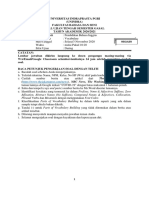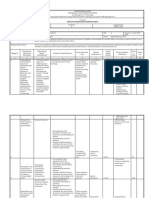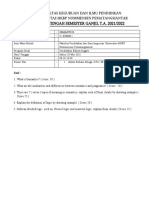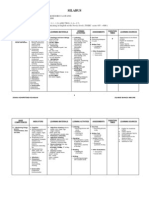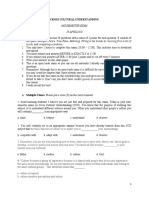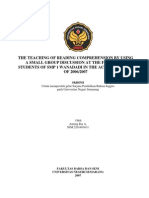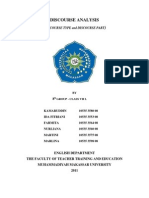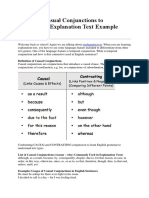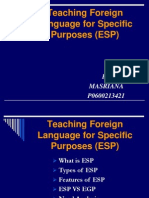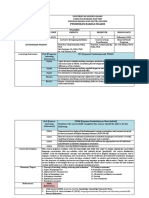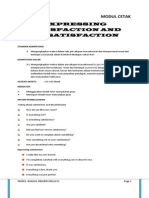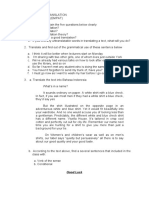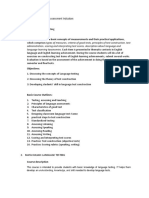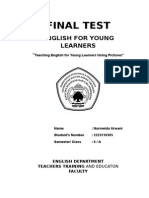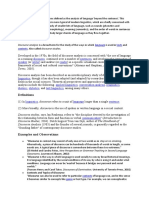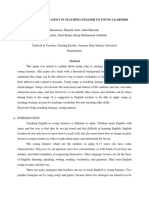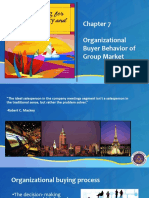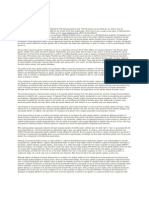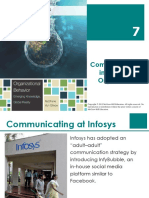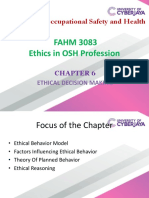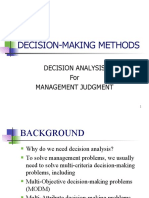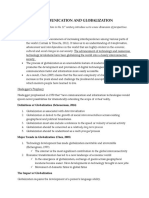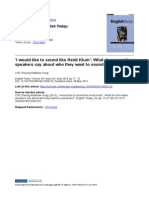Soal Discourse
Uploaded by
Intan Mutiara AkbarSoal Discourse
Uploaded by
Intan Mutiara AkbarIntan Mutiara Akbar – 1202617045
17 DB
Introduction to Analysis Discourse
1. The concept of discourse
In linguistics, discourse refers to a unit of language longer than a single sentence. More
broadly, discourse is the use of spoken or written language in a social context.
Discourse studies, says Jan Renkema, refers to "the discipline devoted to the
investigation of the relationship between form and function in verbal communication"
(Introduction to Discourse Studies, 2004).
(https://www.thoughtco.com/discourse-language-term-1690464)
2. The concept of discourse
In semiotics, linguistics, sociology and anthropology, context refers to those objects or
entities which surround a focal event, in these disciplines typically
a communicative event, of some kind. Context is "a frame that surrounds the event and
provides resources for its appropriate interpretation".[1]:2–3 It is thus a relative concept,
only definable with respect to some focal event within a frame, not independently of that
frame.
(https://en.wikipedia.org/wiki/Context_(language_use))
3. The concept of text
In literary theory, a text is any object that can be "read", whether this object is a work of
literature, a street sign, an arrangement of buildings on a city block, or styles of clothing.
It is a coherent set of signs that transmits some kind of informative message.[1] This set
of symbols is considered in terms of the informative message's content, rather than in
terms of its physical form or the medium in which it is represented.
Within the field of literary criticism, "text" also refers to the original information content
of a particular piece of writing; that is, the "text" of a work is that primal symbolic
arrangement of letters as originally composed, apart from later alterations, deterioration,
commentary, translations, paratext, etc. Therefore, when literary criticism is concerned
with the determination of a "text", it is concerned with the distinguishing of the original
information content from whatever has been added to or subtracted from that content as
it appears in a given textual document (that is, a physical representation of text).
(https://en.wikipedia.org/wiki/Text_(literary_theory))
4. The concept of genre
Genre means a type of art, literature, or music characterized by a specific form, content,
and style. For example, literature has four main genres: poetry, drama, fiction, and non-
fiction. All of these genres have particular features and functions that distinguish them
from one another. Hence, it is necessary on the part of readers to know which category of
genre they are reading in order to understand the message it conveys, as they may have
certain expectations prior to the reading concerned.
(https://literarydevices.net/genre/)
Contexts and Topics of Discourse
"Discourse can also be used to refer to particular contexts of language use, and in this
sense it becomes similar to concepts like genre or text type. For example, we can
conceptualize political discourse (the sort of language used in political contexts) or
media discourse (language used in the media). In addition, some writers have
conceived of discourse as related to particular topics, such as an environmental
discourse or colonial discourse (which may occur in many different genres). Such
labels sometimes suggest a particular attitude towards a topic (e.g. people engaging in
environmental discourse would generally be expected to be concerned with protecting
the environment rather than wasting resources. Related to this, Foucault (1972: 49)
defines discourse more ideologically as 'practices which systematically form the
objects of which they speak.'"
(Paul Baker and Sibonile Ellece, Key Terms in Discourse Analysis. Continuum, 2011)
Discourse and Text
"'Discourse' is sometimes used in contrast with 'text,' where 'text' refers to actual
written or spoken data, and 'discourse' refers to the whole act of communication
involving production and comprehension, not necessarily entirely verbal. . . . The
study of discourse, then, can involve matters like context, background information or
knowledge shared between a speaker and hearer."
(Meriel Bloor and Thomas Bloor, The Practice of Critical Discourse Analysis: an
Introduction. Routledge, 2013)
You might also like
- Lev S. Vygotsky-Mind in Society - The Development of Higher Psychological Processes-Harvard University Press (1978)67% (3)Lev S. Vygotsky-Mind in Society - The Development of Higher Psychological Processes-Harvard University Press (1978)170 pages
- Module 13 Cognitive Development of Infants and Toddlers100% (3)Module 13 Cognitive Development of Infants and Toddlers12 pages
- Teachers' Perception of Using First Language (Indonesian Language) As A Medium of Instruction in Teaching EnglishNo ratings yetTeachers' Perception of Using First Language (Indonesian Language) As A Medium of Instruction in Teaching English14 pages
- Soal Upm Translation Daring Gasal 2020-2021No ratings yetSoal Upm Translation Daring Gasal 2020-20211 page
- Good Luck! : Answer The Following QuestionsNo ratings yetGood Luck! : Answer The Following Questions1 page
- Rencana Pembelajaran Semester (RPS) : Mata Kuliah: English Morphology Kode: MKK31 Dosen Pengampu: Adip Arifin, M.PDNo ratings yetRencana Pembelajaran Semester (RPS) : Mata Kuliah: English Morphology Kode: MKK31 Dosen Pengampu: Adip Arifin, M.PD18 pages
- Rencana Pembelajaran Semester (RPS) : "Advanced English Grammar"No ratings yetRencana Pembelajaran Semester (RPS) : "Advanced English Grammar"6 pages
- Soal Uts English Phonology 2022 - Reguler PagiNo ratings yetSoal Uts English Phonology 2022 - Reguler Pagi2 pages
- Uts Literature Semester Gasal 2021-2022 Reguler PagiNo ratings yetUts Literature Semester Gasal 2021-2022 Reguler Pagi2 pages
- Learning Casual Conjunctions To Understand Explanation Text ExampleNo ratings yetLearning Casual Conjunctions To Understand Explanation Text Example2 pages
- Definisi Speaking Ability (Kemampuan Berbicara)No ratings yetDefinisi Speaking Ability (Kemampuan Berbicara)16 pages
- Students Difficulties in Translating Narative Text100% (2)Students Difficulties in Translating Narative Text5 pages
- Modul Chapter 2 - Watching Sport Event - XNo ratings yetModul Chapter 2 - Watching Sport Event - X13 pages
- Learning Outcomes:: Edition) - New York: Mcgraw-Hill. Practices. New York: Pearson Education IncNo ratings yetLearning Outcomes:: Edition) - New York: Mcgraw-Hill. Practices. New York: Pearson Education Inc13 pages
- 11, 12, 13. Evaluation Models of CoursebookNo ratings yet11, 12, 13. Evaluation Models of Coursebook18 pages
- The Collection of Language Assessment IndicatorsNo ratings yetThe Collection of Language Assessment Indicators16 pages
- UAS-Teaching English For Young Learners Using PicturesNo ratings yetUAS-Teaching English For Young Learners Using Pictures6 pages
- DAFTAR NAMA Dan NIP DOSEN PRODI B.ING1-1No ratings yetDAFTAR NAMA Dan NIP DOSEN PRODI B.ING1-11 page
- Discourse Analysis Is Sometimes Defined As The Analysis of LanguageNo ratings yetDiscourse Analysis Is Sometimes Defined As The Analysis of Language2 pages
- Unravelling Discourse and Discourse Analysis: LexemesNo ratings yetUnravelling Discourse and Discourse Analysis: Lexemes6 pages
- Using Song As Strategy in Teaching English To Young LearnersNo ratings yetUsing Song As Strategy in Teaching English To Young Learners9 pages
- CH7 - Organizational Buyer Behavior of Group MarketNo ratings yetCH7 - Organizational Buyer Behavior of Group Market26 pages
- Communicating in Teams and OrganizationNo ratings yetCommunicating in Teams and Organization25 pages
- Academic Language : Researched and Compiled By: Arielrosales100% (1)Academic Language : Researched and Compiled By: Arielrosales11 pages
- A Study On Artificial Intelligence Operating SystemNo ratings yetA Study On Artificial Intelligence Operating System3 pages
- Avatar - Project Aims For Human Immortality by 20450% (1)Avatar - Project Aims For Human Immortality by 20458 pages
- A Reaction Paper On Communicative Language Teaching100% (1)A Reaction Paper On Communicative Language Teaching9 pages
- Dermatoglyphics Multiple Intelligence Test Report (Compatibility Report)No ratings yetDermatoglyphics Multiple Intelligence Test Report (Compatibility Report)66 pages
- Chen & Li (2018) Measuring The Psychological Distance Between The Organization and Its MembersNo ratings yetChen & Li (2018) Measuring The Psychological Distance Between The Organization and Its Members15 pages
- Final Examination Name: Time/Day: THF 10:30-12:00 Subject: General Psychology Instructor: Mrs. Virginia B. CabarloNo ratings yetFinal Examination Name: Time/Day: THF 10:30-12:00 Subject: General Psychology Instructor: Mrs. Virginia B. Cabarlo2 pages
- APTET PAPER 2 A Shift 2 18th June 2022 Telugu TeluguNo ratings yetAPTET PAPER 2 A Shift 2 18th June 2022 Telugu Telugu52 pages
- Peer Pressure Are Good Predictors of Career Choice Among Grade 11 Student of Sagayen National High SchoolNo ratings yetPeer Pressure Are Good Predictors of Career Choice Among Grade 11 Student of Sagayen National High School5 pages
- W6 Lesson 6 The Social Context of English Part 2 ModuleNo ratings yetW6 Lesson 6 The Social Context of English Part 2 Module11 pages
- Rubric For Evaluating NEWS REPORTS, EOSC 310No ratings yetRubric For Evaluating NEWS REPORTS, EOSC 3101 page
- مناهج الدراسات العليا لقسم اللغة الانكليزيةNo ratings yetمناهج الدراسات العليا لقسم اللغة الانكليزية9 pages









